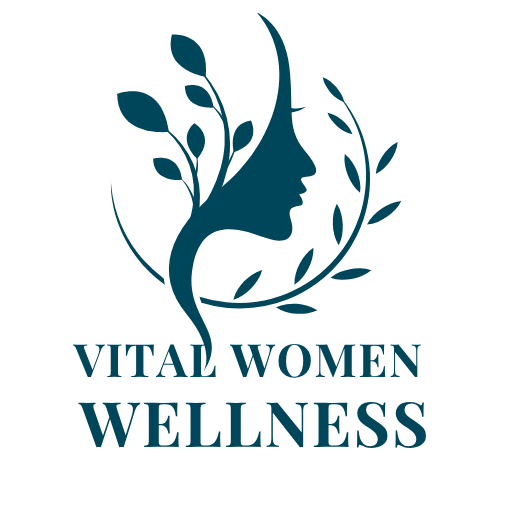Menopause marks a significant transition in a woman’s life. As our bodies undergo hormonal shifts, we often experience a range of symptoms that can be challenging to manage.
Proper nutrition, especially certain key vitamins, can play a crucial role in easing this transition and maintaining overall health.
Understanding Menopause and Nutritional Needs
Menopause typically occurs between the ages of 45 and 55, signaling the end of a woman’s reproductive years. As estrogen levels decline, our bodies undergo many changes affecting everything from bone density to mood regulation.
These shifts create new nutritional demands, making it essential to focus on specific vitamins and minerals to maintain optimal health.
Common menopausal symptoms include hot flashes, night sweats, mood swings, and changes in bone density. While these can be challenging, understanding how to support your body nutritionally can make a significant difference in managing these symptoms and promoting overall well-being.
Let’s explore the top 5 essential vitamins that can help support your health during menopause.
1. Vitamin D: The Bone Health Champion
Vitamin D takes the top spot on our list for good reason. It plays a crucial role in calcium absorption and bone health – two areas of particular concern for menopausal women.
During menopause, the risk of osteoporosis increases significantly because of the loss of estrogen, which helps protect bone density. Vitamin D steps in as a key player in maintaining strong bones by enhancing calcium absorption and supporting bone mineralization.
The benefits of Vitamin D extend beyond bone health. Recent research has shown that it may also help reduce other menopausal symptoms, including mood swings and hot flashes.
Some studies suggest that women with higher levels of Vitamin D experience fewer and less severe hot flashes. To boost your Vitamin D intake, consider spending more time outdoors in the sunlight (with proper sun protection, of course). You can also find it in fatty fish like salmon and mackerel, egg yolks, and fortified foods.
However, many women find it challenging to get enough Vitamin D through diet alone, making supplements a popular choice.
Before starting any supplement regimen, it’s always best to talk to your healthcare provider and get your Vitamin D levels checked. They can help determine the right dosage for your individual needs.
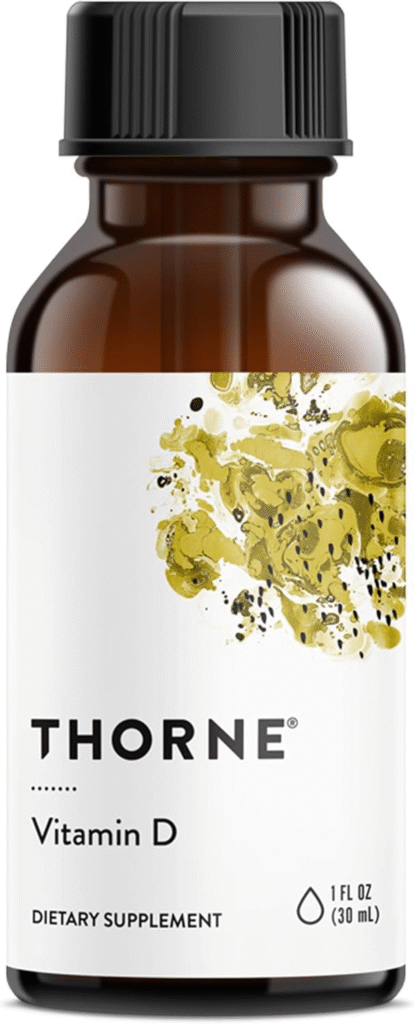
2. Calcium: Building Blocks for Strong Bones
Working hand-in-hand with Vitamin D, calcium is our next essential nutrient for menopausal women. As estrogen levels drop, our bodies become less effective at absorbing and retaining calcium, putting us at increased risk for osteoporosis and fractures.
Ensuring adequate calcium intake becomes crucial during this time. The recommended daily intake for women over 50 is 1,200 milligrams per day.
While dairy products are well-known sources of calcium, there are plenty of other options for those who prefer to limit or avoid dairy.
Some excellent non-dairy sources of calcium include:
- Almonds and other nuts
- Leafy green vegetables like kale, collard greens, and spinach
- Sardines and canned salmon (with bones)
- Fortified plant-based milk choices
- Tofu processed with calcium sulfate
Calcium absorption is most effective when taken in smaller doses throughout the day as opposed to all at once. Also, certain factors can inhibit calcium absorption, such as excessive caffeine or sodium intake, so be mindful of your overall diet.
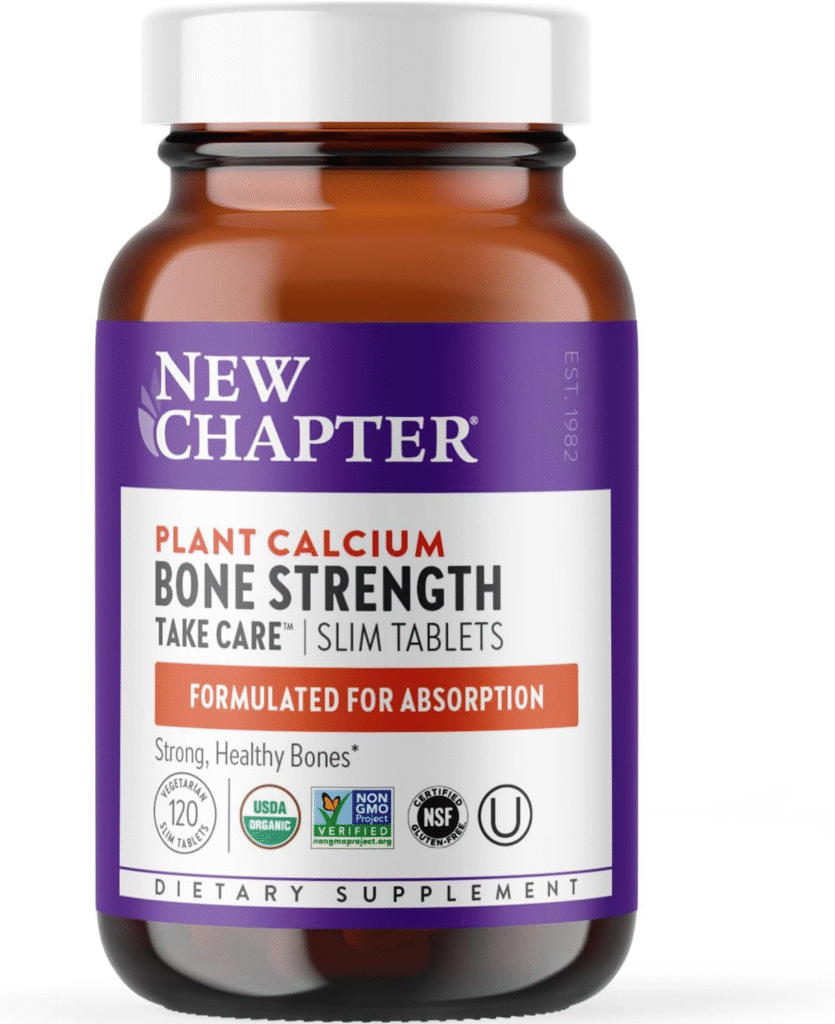
Bone Strength
3. B-Complex Vitamins: Energy and Mood Support
The B-complex vitamins, including B6, B12, and folate, are valuable assets when it comes to managing menopausal symptoms. These vitamins play crucial roles in energy production, brain function, and mood regulation – all of which can be affected during menopause.
Vitamin B6, in particular, has been shown to help reduce the severity of hot flashes and mood swings. It’s involved in the production of serotonin, often called the “feel-good” neurotransmitter, which can help stabilize mood and improve sleep quality.
Vitamin B12 is essential for maintaining energy levels and cognitive function. As we age, our ability to absorb B12 from food sources can decrease, making supplementation or fortified foods important considerations.
Folate, or B9, works alongside B12 to produce red blood cells and support cognitive function. It’s also crucial for heart health, which becomes increasingly important post-menopause when the protective effects of estrogen on the cardiovascular system reduce.
You can find B-complex vitamins in a variety of foods, including:
- Whole grains
- Legumes
- Eggs
- Lean meats
- Nuts and seeds
- Leafy green vegetables
If you’re considering B-vitamin supplements, look for a B-complex that includes all the essential B vitamins in balanced proportions.
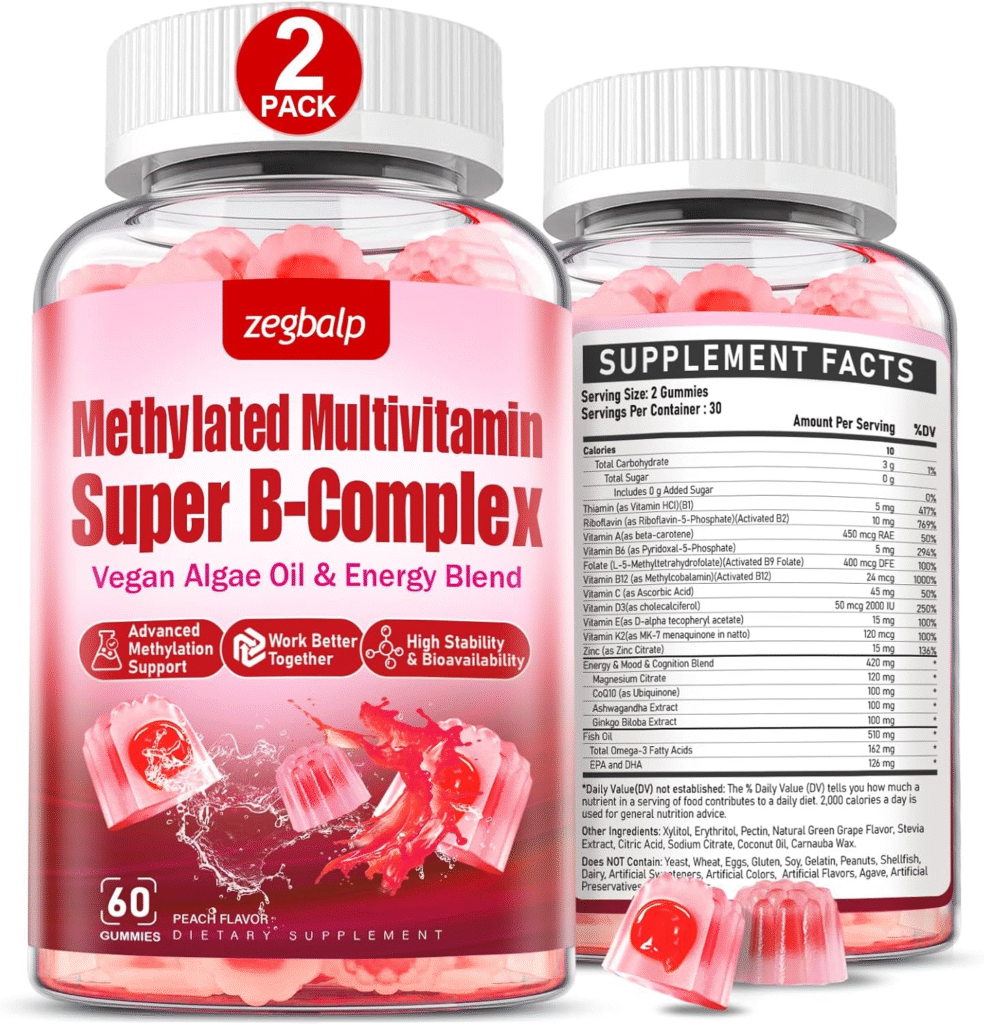
4. Vitamin E: Antioxidant Support
Vitamin E is a powerful antioxidant that can help combat oxidative stress in the body, which tends to increase during menopause. This vitamin has been associated with a reduction in hot flashes and may help reduce vaginal dryness, a common complaint among menopausal women.
Beyond its potential to ease menopausal symptoms, Vitamin E offers several other health benefits. It supports heart health by helping to prevent the oxidation of cholesterol, which can contribute to plaque buildup in the arteries.
It also plays a role in skin health, helping to maintain skin elasticity and hydration – both of which can be affected by the hormonal changes of menopause.
Good dietary sources of Vitamin E include:
- Nuts and seeds, especially almonds and sunflower seeds
- Vegetable oils like sunflower and safflower oil
- Avocados
- Wheat germ
- Spinach and other leafy greens
While it’s generally best to get vitamins from food sources, some women may benefit from Vitamin E supplements. However, high doses can interact with certain medications, so it’s essential to discuss supplementation with your healthcare provider.
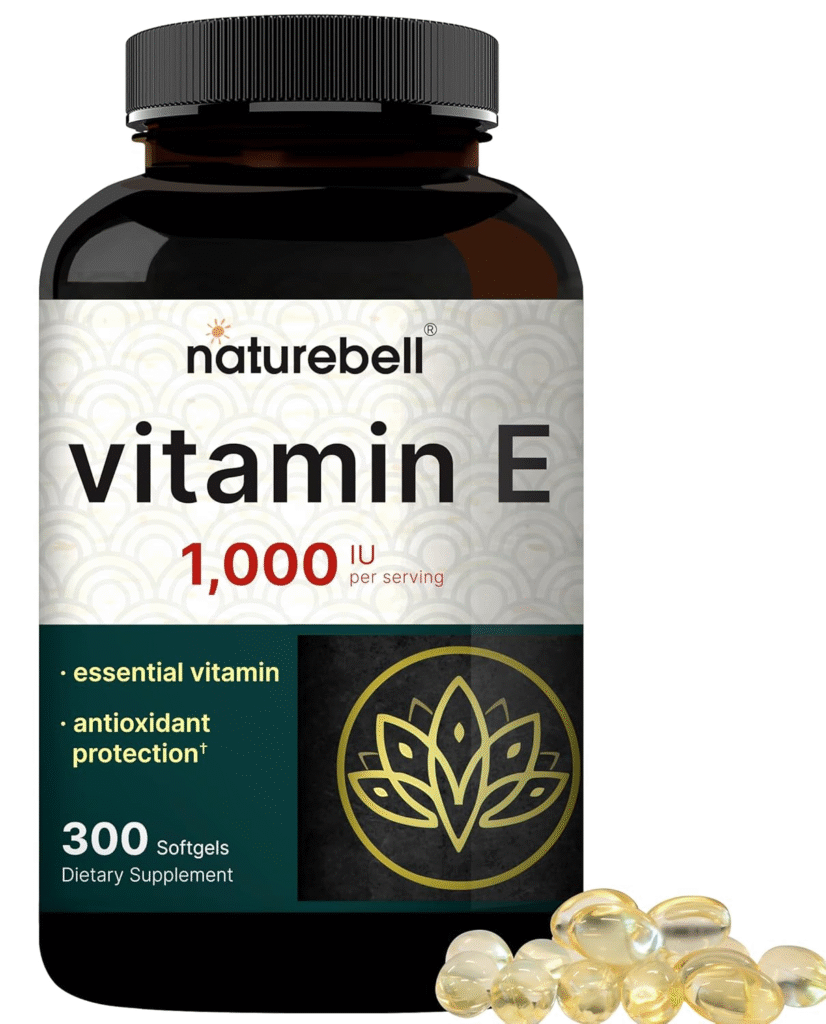
5. Vitamin K: The Bone Protector
Last but certainly not least on our list is Vitamin K. While it might not be as well-known as some of the other vitamins we’ve discussed, Vitamin K plays a crucial role in bone health and blood clotting.
There are two main types of Vitamin K: K1 and K2. Vitamin K1 is primarily involved in blood clotting, while K2 is particularly important for bone health.
Vitamin K2 works synergistically with Vitamin D and calcium to help direct calcium to the bones where it’s needed, as opposed to allowing it to build up in soft tissues or arteries.
Some studies suggest that adequate Vitamin K intake may help reduce the risk of osteoporosis and fractures in postmenopausal women. It may also support heart health by helping to prevent calcium deposits in the arteries.
You can find Vitamin K in:
- Leafy green vegetables like kale, spinach, and collard greens
- Fermented foods like natto (a Japanese fermented soybean dish)
- Cheese, especially hard cheeses
- Egg yolks
- Meat, particularly organ meats
While Vitamin K deficiency is relatively rare in healthy adults, some women may benefit from increased intake during and after menopause. As always, talk to your healthcare provider before starting any new supplement regimen.
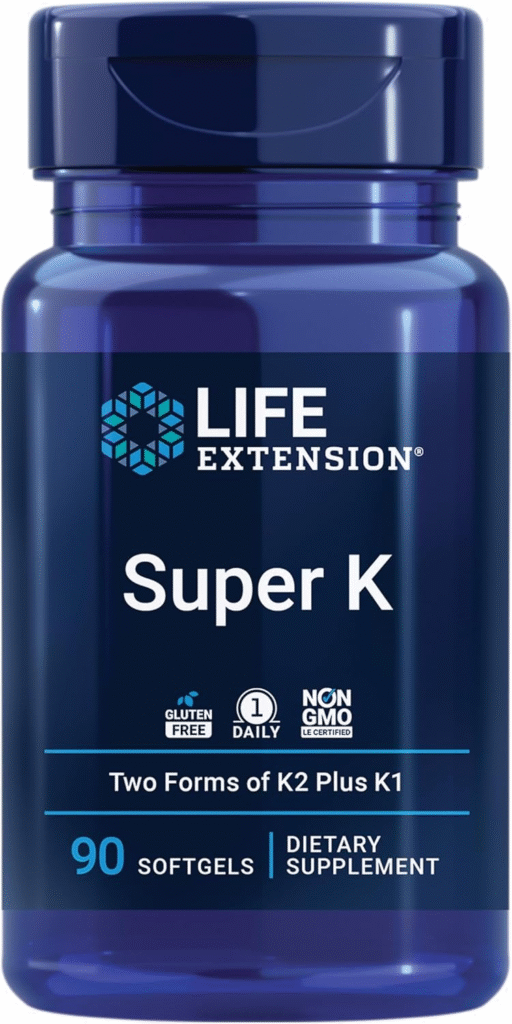
Putting It All Together: A Holistic Approach to Menopausal Nutrition
While these five vitamins are essential for menopausal health, they work best as part of a balanced, nutrient-rich diet. Focusing on whole foods, plenty of fruits and vegetables, lean proteins, and healthy fats can provide a wide range of vitamins, minerals, and other useful compounds that support overall health during menopause.
Additionally, don’t forget the importance of other lifestyle factors in managing menopausal symptoms. Regular exercise, stress management techniques like meditation or yoga, and maintaining a healthy weight can all contribute to a smoother transition through menopause.
Every woman’s experience with menopause is unique, and what works for you may not work for another. It’s always best to work with your healthcare provider to develop a personalized plan that addresses your specific needs and concerns.
By focusing on these essential vitamins and adopting a holistic approach to health, you can navigate the changes of menopause with greater ease and vitality.
People Also Asked
What vitamins help with menopause symptoms?
Vitamins D, E, and B-complex vitamins have been shown to help reduce various menopause symptoms. Vitamin D may help with mood swings and hot flashes, while Vitamin E can potentially reduce hot flashes and vaginal dryness.
B-complex vitamins, particularly B6, can help with mood regulation and energy levels.
How much calcium should a menopausal woman take daily?
The recommended daily intake of calcium for women over 50 is 1,200 milligrams per day. This can be obtained through a combination of dietary sources and supplements if necessary.
Can vitamin D help with hot flashes?
Some studies suggest that women with higher levels of Vitamin D may experience fewer and less severe hot flashes. While research is ongoing, maintaining adequate Vitamin D levels is important for overall health during menopause.
Are there any vitamins that can help with menopausal weight gain?
While no vitamin directly causes weight loss, B-complex vitamins can help support metabolism and energy levels, which may indirectly assist with weight management during menopause.
How does Vitamin K help during menopause?
Vitamin K, particularly K2, works alongside Vitamin D and calcium to support bone health. It helps direct calcium to the bones where it’s needed, potentially reducing the risk of osteoporosis in postmenopausal women.
Can increasing vitamin intake replace hormone replacement therapy?
Vitamins and minerals are important for overall health during menopause, but they cannot replace hormone replacement therapy (HRT). The decision to use HRT should be made in consultation with a healthcare provider based on individual health needs and risks.
What foods are high in Vitamin E for menopause?
Foods high in Vitamin E include nuts (especially almonds), seeds (like sunflower seeds), vegetable oils, avocados, and leafy green vegetables.
How long does it take for vitamins to help with menopause symptoms?
The time it takes to see benefits from vitamin supplementation can vary widely depending on the individual and the specific vitamin. Some women may notice improvements in a few weeks, while for others it may take several months. Consistency is key when it comes to vitamin intake.
Can B vitamins help with menopausal mood swings?
Yes, B-complex vitamins, particularly B6, can help with mood regulation during menopause. They play a crucial role in the production of neurotransmitters that affect mood and can help reduce symptoms of depression and anxiety.
Is it safe to take many vitamins during menopause?
While taking many vitamins can be safe and useful during menopause, it’s important to talk to a healthcare provider before starting any new supplement regimen. Some vitamins can interact with medications or have side effects when taken in high doses.
Key Takeaways:
- Vitamin D and calcium work together to support bone health during menopause.
- B-complex vitamins can help manage energy levels, mood swings, and cognitive function.
- Vitamin E acts as an antioxidant and may help reduce hot flashes and vaginal dryness.
- Vitamin K plays a crucial role in bone health and works synergistically with Vitamin D and calcium.
- A balanced, nutrient-rich diet combined with a healthy lifestyle is key to managing menopausal symptoms effectively.
Disclaimer
The information contained in this post is for general information purposes only. The information is provided by Top 5 Essential Vitamins for Menopause: Navigating the Change with Nutritional Support and while we endeavor to keep the information up to date and correct, we make no representations or warranties of any kind, express or implied, about the completeness, accuracy, reliability, suitability or availability with respect to the website or the information, products, services, or related graphics contained on the post for any purpose.
